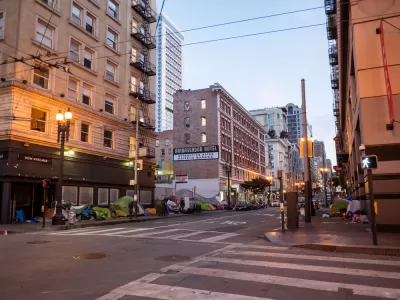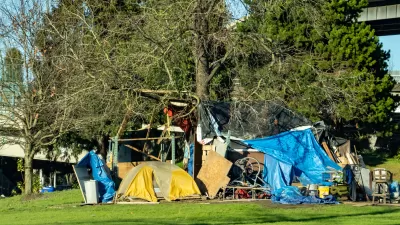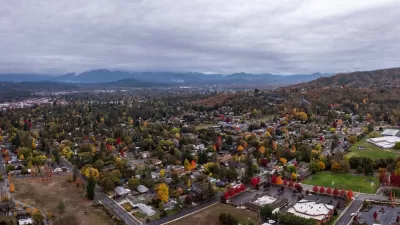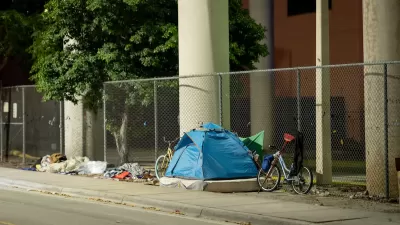Measure O may be one of the first ballot measures of its kind to empower residents to take legal action against a city for illegal encampments on city property. The Sacramento City Council voted 7-2 on August 9 to place the ordinance before voters.

Lawsuits against cities over sidewalk encampments are becoming more common, report Lauren Hepler and Raheem Hosseini for the San Francisco Chronicle on September 23.
In the Tenderloin, it was UC Hastings College of the Law that sued the city of San Francisco over “abandoning” the neighborhood to tents and open drug dealing. In Venice Beach, a couple with two kids filed suit against Los Angeles over the tent city outside their front door. From Phoenix to Portland, Ore., other cases brought by residents fed up with what they see as the ill effects of homeless encampments are also winding through the courts.
Now, a Sacramento city ballot measure will ask voters to go a step farther: Measure O, officially called the “Emergency Shelter and Enforcement Act of 2022 [pdf],” would create a new public nuisance process for private citizens to take legal action against the city over encampments.
Measure O, aka the Homeless Persons Shelter and Encampment Measure, is a legislatively referred ballot measure that will appear with two other measures for the City of Sacramento November 8 election. It is a yes or no question appearing on the bottom of page 1 of the adopted city council resolution [pdf] on August 9. Italics added:
“Shall the measure entitled The City of Sacramento Emergency Shelter and Enforcement Act of 2022 – which requires identification of a minimum number of emergency shelter spaces based on the estimated number of homeless persons; conditions enforcement of the city’s unlawful camping ordinance on shelter space availability; prohibits encampments; allows residents to bring action against the city for unlawful camping or storage on city property; and limits the city’s annual general fund budget obligation to $5,000,000 – be adopted?”
Before legal action could be initiated by residents, the city must first “add 605 new emergency shelter spaces — whether outdoor or indoor, congregate or individual,” add Hepler and Hosseini.
Martin v. Boise
“Some unhoused residents and their advocates see the effort as an example of cities seeking new ways around a landmark court case, Martin v. Boise, which held that it violates the U.S. Constitution’s ban on cruel and unusual punishment to prohibit people from sleeping outside if there is no alternative,” add Hepler and Hosseini. [See 6 posts tagged Martin v. City of Boise.]
The landmark case, decided in September 2018 by the Ninth Court of Appeals in San Francisco, was the basis of a lawsuit brought by Sacramento homeless advocates against the Sacramento measure. “A judge on [Aug. 25] ruled the city of Sacramento can put an anti-camping ballot measure before voters in November, but said the court may intervene after the election," reported Kristin Lam for Capital Public Radio on August 25.
[Sacramento County Superior Court Judge Shelleyanne] Chang ruled that advocates failed to show the measure is invalid, but said the measure can be legally challenged if voters pass it. She added it is unclear if the Martin ruling applies to the measure and whether the measure would violate the case.
The ruling came two days after Sacramento city and county government officials passed ordinances banning encampments on sidewalks, along the American River Parkway or at places deemed critical infrastructure.
Bounty hunting?
One of the most interesting aspects of the lengthy source article was the comparison of Measure O to 'bounty hunting laws' such as the Texas Heartbeat Act that empowered residents to sue abortion providers and a new California gun safety law that is patterned on it.
Related:
- Los Angeles Tightens Restrictions on Encampments, August 9, 2022
- Judge Bars Sacramento Encampment Sweeps, August 7, 2022
- L.A. Shifts Homeless Policy to Clear Street Encampments, November 22, 2021
- Supreme Court Refuses Landmark Homelessness Case, December 16, 2019
FULL STORY: California’s homelessness crisis hits new flash point: Private residents suing cities over encampments

Maui's Vacation Rental Debate Turns Ugly
Verbal attacks, misinformation campaigns and fistfights plague a high-stakes debate to convert thousands of vacation rentals into long-term housing.

Planetizen Federal Action Tracker
A weekly monitor of how Trump’s orders and actions are impacting planners and planning in America.

In Urban Planning, AI Prompting Could be the New Design Thinking
Creativity has long been key to great urban design. What if we see AI as our new creative partner?

King County Supportive Housing Program Offers Hope for Unhoused Residents
The county is taking a ‘Housing First’ approach that prioritizes getting people into housing, then offering wraparound supportive services.

Researchers Use AI to Get Clearer Picture of US Housing
Analysts are using artificial intelligence to supercharge their research by allowing them to comb through data faster. Though these AI tools can be error prone, they save time and housing researchers are optimistic about the future.

Making Shared Micromobility More Inclusive
Cities and shared mobility system operators can do more to include people with disabilities in planning and operations, per a new report.
Urban Design for Planners 1: Software Tools
This six-course series explores essential urban design concepts using open source software and equips planners with the tools they need to participate fully in the urban design process.
Planning for Universal Design
Learn the tools for implementing Universal Design in planning regulations.
planning NEXT
Appalachian Highlands Housing Partners
Mpact (founded as Rail~Volution)
City of Camden Redevelopment Agency
City of Astoria
City of Portland
City of Laramie





























